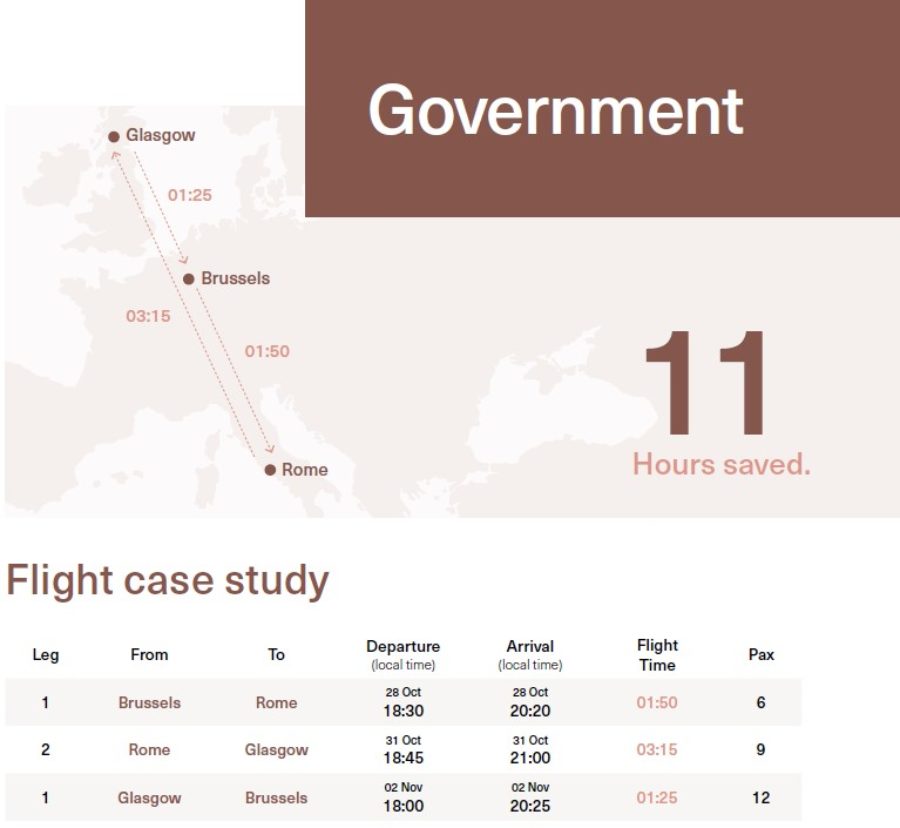
Business aviation serving world leaders: The use of government flights when time not just matters but prevents conflicts
Business aviation serves as a vital means of transportation for world leaders, facilitating face-to-face meetings and enabling impactful decision-making for the benefit of citizens...
In recent months, several media articles have surfaced criticising the use of government flights by political leaders at both the European and national levels, including prominent figures such as President of the European Commission Ursula Von der Leyen, European Council President Charles Michel, and German Foreign Minister Annalena Baerbock. There is no doubt about the role of diplomacy in facilitating collaborative dialogue and negotiations among governments to shape decisions that ultimately impact the lives of millions of citizens worldwide. Effective diplomacy is unimaginable without deep personal relationships, as became evident during the recent period of forced social distancing due to the COVID-19 pandemic. In this light, it is fundamental for the Business aviation sector to educate on the fact that an often overlooked yet significant use case of business jets is providing efficient transport solutions to world leaders.
The importance of face-to-face meetings for international diplomacy
International affairs is going through a profound change of dynamics, seeing more international competition between states and ever-growing instability in many corners of the world. Diplomacy and dialogue have become crucial to prevent global crises. In light of these tense geopolitical circumstances, how can world leaders conduct effective diplomatic relations in every corner of the world when the means of connectivity are not guaranteed and the timing of peace-brokering decisions really matters?
Business aviation role in providing efficient transport to world leaders
This is exactly where Business aviation delivers by providing a tailor-made service to heads of state, ministers and high-level diplomats to meet their legitimate demands: the efficiency, privacy and security of the transportation mode. To assist in avoiding acts of terror, conflict zones or other risky situations, using Business aviation enables discrete and secure travel for world leaders while maximising their productivity despite extremely tight schedules.
To offer a practical illustration of a government flight, EBAA requested one of its members to provide details about such a mission type. In the following case study, a public institution chartered a business jet with a capacity of 12 passengers (Embraer Legacy, Bombardier Challenger 850, or equivalent) to visit two major gatherings with a delegation. The first flight was from Brussels to Rome to visit the G20 Summit which took place on 30-31th of October 2021. At the end of the G20 Summit, the delegation flew directly to Glasgow to attend the COP26 on the 1st and 2nd of November. The plane then transported an even bigger delegation, composed of multiple institutions who made arrangements to coordinate their travel requirements, back to Brussels. This resulted in a total saving of 11 hours for the delegation compared to scheduled air travel.

Such a case study for Business aviation has also demonstrated that the agendas of such delegations tend to change constantly, and the logistics behind them are often extremely complicated due to security risks as well as diplomacy-related aspects. It is worth noting that the carbon emissions for institutional flights are often reported and compensated for in the framework of the EU Emissions Trading Scheme (ETS). In this particular case, a 35% blend of Sustainable Aviation Fuel (SAF) was physically uploaded into the aircraft to operate the above-mentioned route.
Addressing public scrutiny and promoting responsible use of government and diplomatic flights
Public scrutiny surrounding governmental and diplomatic flights, due to their exclusive nature and climate impact, has increased substantially in recent times. It is essential not to overlook this phenomenon. Governments and elected leaders should openly address the fully legitimate benefits of utilising Business aviation to fulfil their roles in representing the interests of their citizens. In line with their recently announced recommendation on the use of Sustainable Aviation Fuel (SAF) for operators and airports, EBAA and GAMA also encourage governments to request SAF for their diplomatic flights from operators. This approach would demonstrate a responsible commitment to climate protection and support the aviation industry’s unwavering goal of achieving net-zero emissions by 2050.




